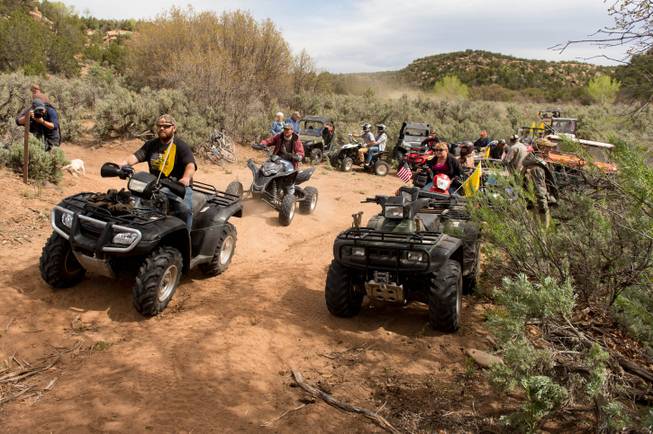
Trent Nelson / AP
ATV riders cross into a restricted area of Recapture Canyon, north of Blanding, Utah, on Saturday, May 10, 2014, in a protest against what demonstrators call the federal government’s overreaching control of public lands. The area has been closed to motorized use since 2007 when an illegal trail was found that cuts through Ancestral Puebloan ruins. The canyon is open to hikers and horseback riders.
Monday, Oct. 23, 2017 | 1:40 p.m.
SALT LAKE CITY — A federal appeals court on Monday refused to overturn a misdemeanor conviction for a Utah county commissioner who became a cause celebre in a movement challenging U.S. management of public lands in the West.
The 10th U.S. Circuit Court of Appeals rejected arguments that Phil Lyman's trial was tainted by the judge's friendship with a conservation group lawyer.
Lyman and blogger Monte Wells were convicted of federal misdemeanor charges for their roles in an ATV protest ride through parts of southern Utah's Recapture Canyon, which was closed to motor vehicles to protect ruins that are nearly 2,000 years old.
The 2014 ride took place shortly after the government standoff with Nevada rancher Cliven Bundy over similar issues challenging federal management of public lands in the American West.
The canyon's closure has long been a source of tension, and the case showcased the deep-rooted strain between the government and residents over land use. The issue re-emerged in 2016 when an armed group occupied the headquarters of a national wildlife refuge in southeastern Oregon.
The 10th Circuit ruled that U.S. District Judge Robert Shelby didn't treat Lyman and Wells unfairly and recused himself after their lawyers protested his friendship with the legal director of the Southern Utah Wilderness Alliance.
The judges say the group wasn't a party to the case, and Shelby could not have been expected to know that it had pushed prosecutors to file the case and passed along social-media postings, as the defendants contend.
Lyman, who acted as his own lawyer, did not immediately return a message seeking comment. He has argued that the ride was a legal expression of frustration with environmentalists' sway over U.S. land managers, and the riders didn't enter protected parts of the canyon.
Wells said he's disappointed in the ruling in the case that he calls emblematic of frustrations over federal management of public land.
"To me, Recapture is the key because it stands for everything that they're doing," he said, adding that the road had long seen hard use and the decision to close it to motor vehicles was arbitrary.
Lyman was sentenced to 10 days in jail and to pay $96,000 in restitution, while Wells got five days in jail.
